Netty-核心模块组件-4
Netty 核心模块组件
一、Bootstrap、ServerBootstrap
1、Bootstrap 意思是引导,一个 Netty 应用通常由一个 Bootstrap 开始,主要作用是配置整个 Netty 程序,串联各个组件Netty中
Bootstrap类是客户端程序的启动引导类ServerBootstrap是服务端启动引导类
2、常见的方法
public ServerBootstrap group(EventLoopGroup parentGroup, EventLoopGroup childGroup),该方法用于服务器端,用来设置两个 EventLoop
public B group(EventLoopGroup group) ,该方法用于客户端,用来设置一个 EventLoop
public B channel(Class<? extends C> channelClass),该方法用来设置一个服务器端的通道实现
public < T > B option(ChannelOption option, T value),用来给 ServerChannel 添加配置
public < T > ServerBootstrap childOption(ChannelOption childOption, T value),用来给接收到的通道添加配置
public ServerBootstrap childHandler(ChannelHandler childHandler),该方法用来设置业务处理类(自定义的handler)针对WorkerGroup(干活的类)
public ServerBootstrap handler(ChannelHandler handler)针对BoosGroup(专门负责接收客户端请求的类)
public ChannelFuture bind(int inetPort) ,该方法用于服务器端,用来设置占用的端口号
public ChannelFuture connect(String inetHost, int inetPort) ,该方法用于客户端,用来连接服务器端
二、Future、ChannelFuture
Netty 中所有的 IO 操作都是异步的,不能立刻得知消息是否被正确处理。
但是可以过一会等它执行完成或者直接注册一个监听,具体的实现就是通过 Future 和 ChannelFutures,他们可以注册一个监听,当操作执行成功或失败时监听会自动触发注册的监听事件。
常见的方法:
- Channel channel(),返回当前正在进行 IO 操作的通道
- ChannelFuture sync(),等待异步操作执行完毕
三、Channel
1、Netty 网络通信的组件,能够用于执行网络 I/O 操作
2、通过 Channel 可获得当前网络连接的通道的状态
3、通过 Channel 可获得 网络连接的配置参数 (例如接收缓冲区大小)
4、Channel 提供异步的网络 I/O 操作(如建立连接,读写,绑定端口),异步调用意味着任何 I/O 调用都将立即返回,并且不保证在调用结束时所请求的 I/O 操作已完成
5、调用立即返回一个 ChannelFuture 实例,通过注册监听器到 ChannelFuture 上,可以 I/O 操作成功、失败或取消时回调通知调用方
6、支持关联 I/O 操作与对应的处理程序
7、不同协议、不同的阻塞类型的连接都有不同的 Channel 类型与之对应,常用的 Channel 类型
- NioSocketChannel,异步的客户端 TCP Socket 连接。
- NioServerSocketChannel,异步的服务器端 TCP Socket 连接。
- NioDatagramChannel,异步的 UDP 连接。
- NioSctpChannel,异步的客户端 Sctp 连接。
- NioSctpServerChannel,异步的 Sctp 服务器端连接,这些通道涵盖了 UDP 和 TCP 网络 IO 以及文件 IO。
四、Selector
1、Netty 基于 Selector 对象实现 I/O 多路复用,通过 Selector 一个线程可以监听多个连接的 Channel 事件。
2、当向一个 Selector 中注册 Channel 后,Selector 内部的机制就可以自动不断地查询(Select) 这些注册的Channel 是否有已就绪的 I/O 事件(例如可读,可写,网络连接完成等),这样程序就可以很简单地使用一个线程高效地管理多个 Channel
五、ChannelHandler 及其实现类
1、ChannelHandler 是一个接口,处理 I/O 事件或拦截 I/O 操作,并将其转发到其 ChannelPipeline(业务处理链)中的下一个处理程序。
2、ChannelHandler 本身并没有提供很多方法,因为这个接口有许多的方法需要实现,方便使用期间,可以继承它的子类
3、ChannelHandler 及其实现类一览图
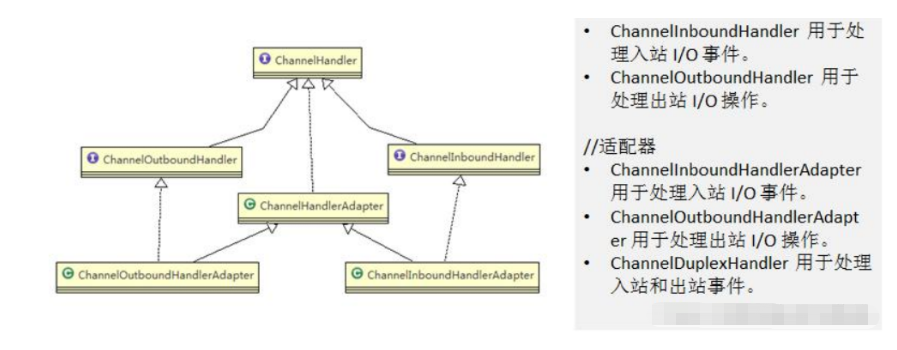
4、我们经常需要自定义一个 Handler 类去继承 ChannelInboundHandlerAdapter
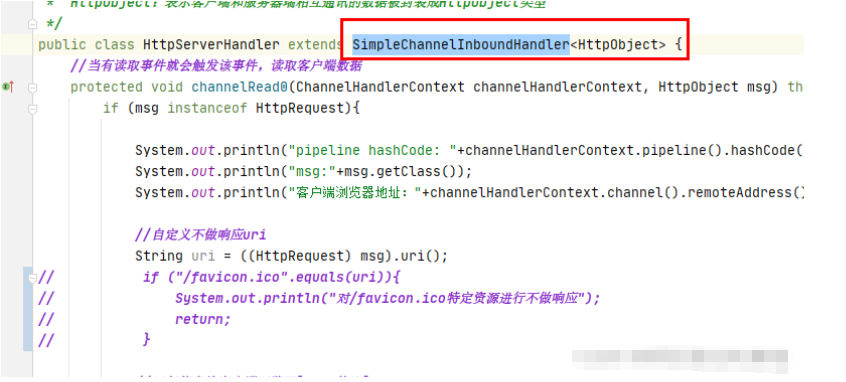
5、然后通过重写相应方法实现业务逻辑,我们接下来看看一般都需要重写哪些方法
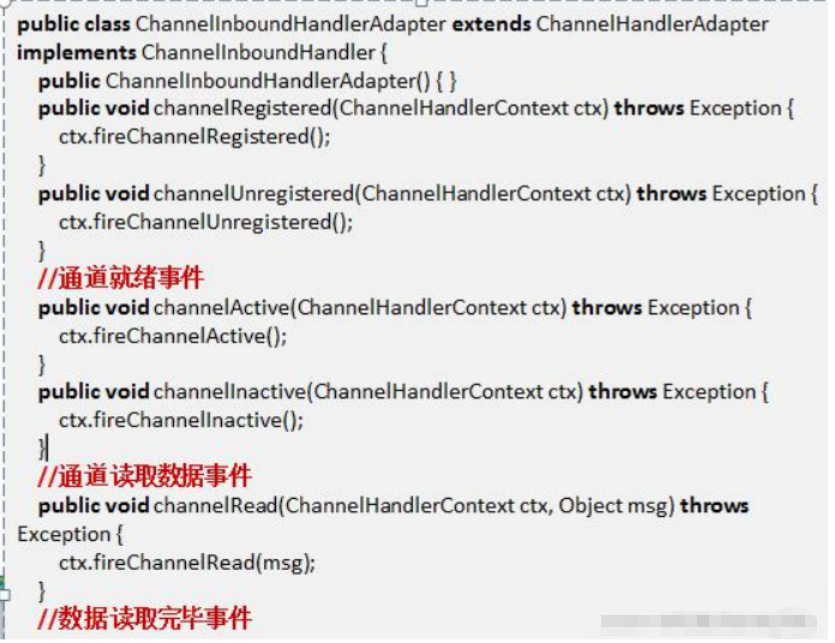
六、Pipeline 和 ChannelPipeline
1、ChannelPipeline 是一个重点
1、ChannelPipeline 是一个 Handler 的集合
2、它负责处理和拦截 inbound 或者 outbound 的事件和操作,相当于一个贯穿 Netty 的链。(也可以这样理解:ChannelPipeline 是 保存 ChannelHandler 的 List,用于处理或拦截Channel 的入站事件和出站操作)
3、ChannelPipeline 实现了一种高级形式的拦截过滤器模式,使用户可以完全控制事件的处理方式,以及 Channel中各个的 ChannelHandler 如何相互交互
4、在 Netty 中每个 Channel 都有且仅有一个 ChannelPipeline 与之对应,它们的组成关系如下

- channel能拿到他对应的channelPipeline
- channelPipeline也可以获取到对应的channel
- channelPipeline中包含一个个的ChannelHandlerContext的双向链表
- 每个ChannelHandlerContext(保存 Channel 相关的所有上下文信息)里面包含对应具体的channelHandler
2、常用方法
1、ChannelPipeline addFirst(ChannelHandler… handlers) 把一个业务处理类(handler)添加到链中的第一个位置
2、ChannelPipeline addLast(ChannelHandler… handlers) 把一个业务处理类(handler)添加到链中的最后一个位置

七、ChannelHandlerContext
1、保存 Channel 相关的所有上下文信息,同时关联一个 ChannelHandler 对象
2、即 ChannelHandlerContext 中 包 含 一 个 具 体 的 事 件 处 理 器 ChannelHandler , 同 时ChannelHandlerContext 中也绑定了对应的 pipeline 和 Channel 的信息,方便对 ChannelHandler 进行调用.
3、常用方法

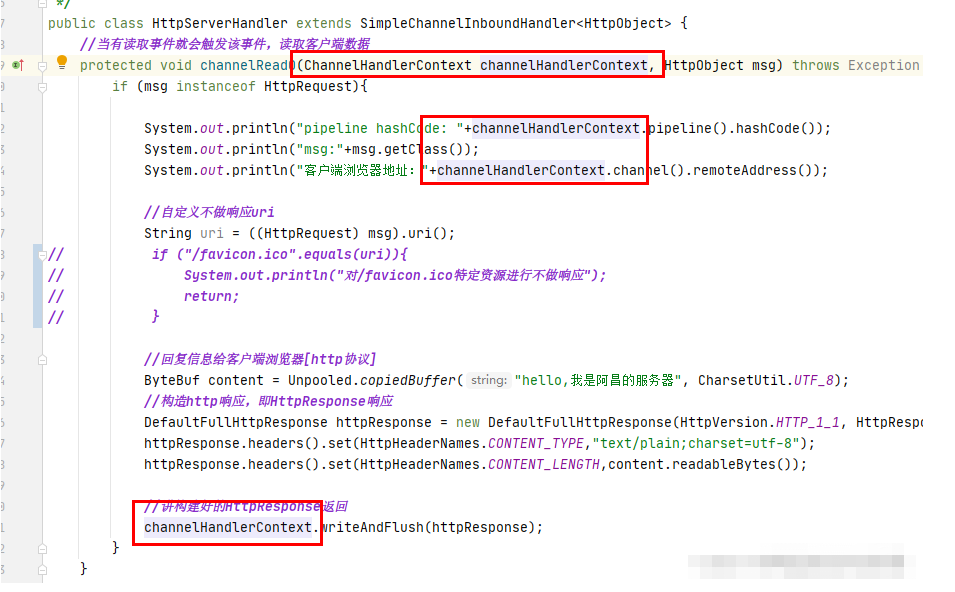
八、ChannelOption
1、Netty 在创建 Channel 实例后,一般都需要设置 ChannelOption 参数。
2、ChannelOption 参数如下:

九、EventLoopGroup 和其实现类 NioEventLoopGroup
1、EventLoopGroup 是一组 EventLoop(就是对应线程) 的抽象,Netty 为了更好的利用多核 CPU 资源,一般会有多个 EventLoop同时工作,每个 EventLoop 维护着一个 Selector 实例。
2、EventLoopGroup 提供 next 接口,可以从组里面按照一定规则获取其中一个 EventLoop 来处理任务。
3、在 Netty服务器端编程中 ,我们一般 都 需 要 提 供 两 个 EventLoopGroup , 例如 :
- BossEventLoopGroup
- WorkerEventLoopGroup
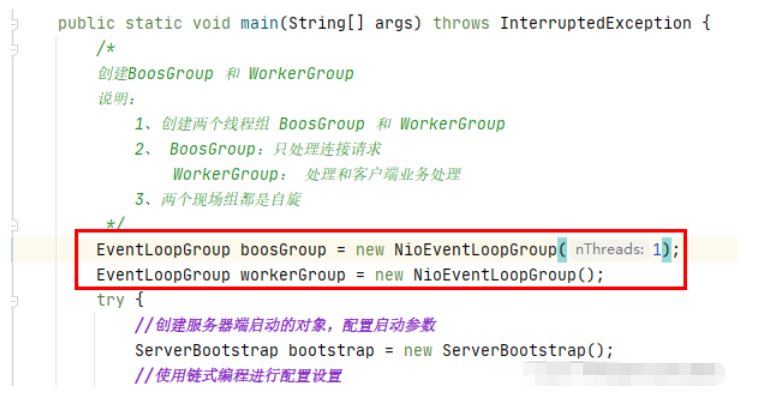
4、通常一个服务端口即一个 ServerSocketChannel 对应一个 Selector 和一个 EventLoop 线程。
5、服务端中,BossEventLoop 负责接收客户端的连接并将 SocketChannel 交给 WorkerEventLoopGroup 来进行 IO 处理,如下图所示
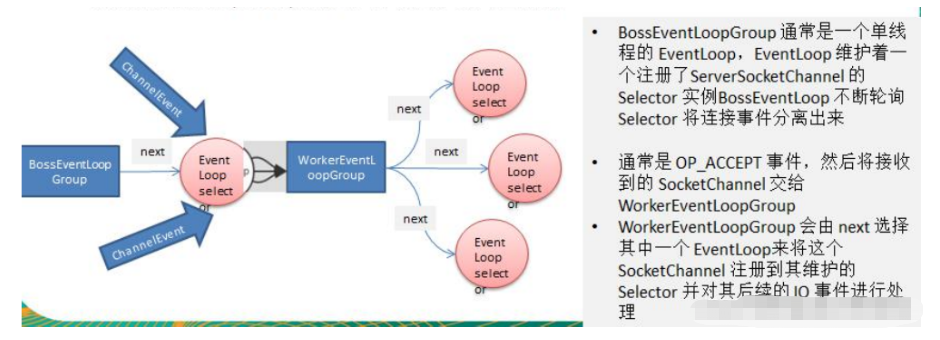
6、常用方法:
public NioEventLoopGroup(),构造方法
public Future<?> shutdownGracefully(),断开连接,关闭线程
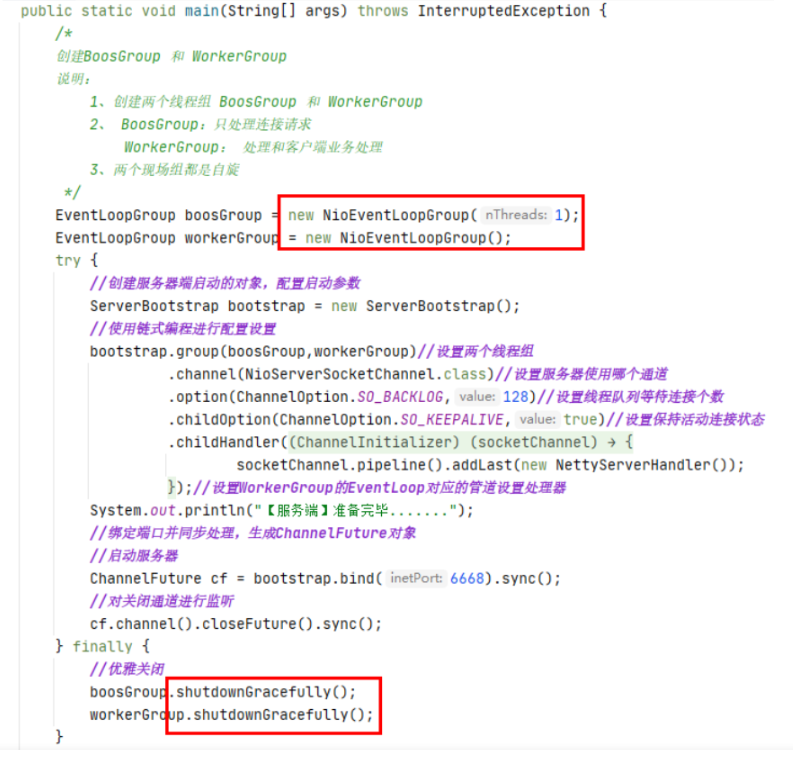
十、 Unpooled 类
1、Netty 提供一个专门用来操作缓冲区(即 Netty 的数据容器)的工具类
2、内部维护了对应的readerIndex和writerIndex
3、相比NIO的ByteBuffer,Netty 提供的ByteBuf不用考虑flip反转去操作读写
4、常用方法如下所示

5、举例说明 Unpooled 获取 Netty 的数据容器 ByteBuf 的基本使用

6、案例一
package com.sun.netty.components; import io.netty.buffer.ByteBuf; import io.netty.buffer.Unpooled; /** * @Author: sunguoqiang * @Description: TODO * @DateTime: 2023/1/4 17:14 **/ public class NettyByteBuf01 { public static void main(String[] args) { /** * 创建一个 ByteBuf * 说明: * 1. 创建 对象,该对象包含一个数组 arr , 是一个 byte[10] * 2. 在 netty 的 buffer 中,不需要使用 flip 进行反转 , 底层维护了 readerindex 和 writerIndex * 3. 通过 readerindex 和 writerIndex 和 capacity, 将 buffer 分成三个区域 * 1、0---readerindex 已经读取的区域、 * 2、readerindex---writerIndex,可读的区域、 * 3、writerIndex---capacity, 可写的区域 */ ByteBuf buffer = Unpooled.buffer(10); for (int i = 0; i < 10; i++) { buffer.writeByte(i); } System.out.println("capacity=" + buffer.capacity());//10 // 输出 for (int i = 0; i < buffer.capacity(); i++) { // 此方式readerindex不会改变 System.out.println(buffer.getByte(i)); } for (int i = 0; i < buffer.capacity(); i++) { // 此方式readerindex会改变 System.out.println(buffer.readByte()); } System.out.println("执行完毕"); } }
7、案例二
package com.sun.netty.components; import io.netty.buffer.ByteBuf; import io.netty.buffer.Unpooled; import java.nio.charset.Charset; /** * @Author: sunguoqiang * @Description: TODO * @DateTime: 2023/1/4 17:14 **/ public class NettyByteBuf02 { public static void main(String[] args) { // 创建 ByteBuf ByteBuf byteBuf = Unpooled.copiedBuffer("hello,world!", Charset.forName("utf-8")); // 使用相关的方法 if (byteBuf.hasArray()) { // true byte[] content = byteBuf.array(); // 将 content 转成字符串 System.out.println(new String(content, Charset.forName("utf-8"))); // 输出ByteBuf对象 System.out.println("byteBuf=" + byteBuf); // 输出byteBuf偏移量 System.out.println(byteBuf.arrayOffset()); // 0 // byteBuf读取索引位置 System.out.println(byteBuf.readerIndex()); // 0 // byteBuf写入索引位置 System.out.println(byteBuf.writerIndex()); // 12 // byteBuf容量 System.out.println(byteBuf.capacity()); // 36 // byteBuf可读取的第一个字节 System.out.println(byteBuf.readByte()); // 104 // byteBuf指定索引位置的字节 System.out.println(byteBuf.getByte(0)); // 104 // byteBuf可读取字节数 int len = byteBuf.readableBytes(); // 12 System.out.println("len=" + len); //使用 for 取出各个字节 for (int i = 0; i < len; i++) { System.out.println((char) byteBuf.getByte(i)); } // 按照某个范围读取 System.out.println(byteBuf.getCharSequence(0, 4, Charset.forName("utf-8"))); System.out.println(byteBuf.getCharSequence(4, 6, Charset.forName("utf-8"))); } } }
十一、Netty 应用实例-群聊系统
1、实例要求
1、编写一个 Netty 群聊系统,实现服务器端和客户端之间的数据简单通讯(非阻塞)
2、实现多人群聊
3、服务器端:可以监测用户上线,离线,并实现消息转发功能
4、客户端:通过 channel 可以无阻塞发送消息给其它所有用户,同时可以接受其它用户发送的消息(有服务器转发得到)
5、目的:进一步理解 Netty 非阻塞网络编程机制
2、服务端
GroupChatServer 服务端

package com.sun.netty.groupChat; import io.netty.bootstrap.ServerBootstrap; import io.netty.channel.ChannelFuture; import io.netty.channel.ChannelInitializer; import io.netty.channel.ChannelOption; import io.netty.channel.ChannelPipeline; import io.netty.channel.nio.NioEventLoopGroup; import io.netty.channel.socket.SocketChannel; import io.netty.channel.socket.nio.NioServerSocketChannel; import io.netty.handler.codec.string.StringDecoder; import io.netty.handler.codec.string.StringEncoder; /** * @Author: sunguoqiang * @Description: 群聊系统服务端 * @DateTime: 2023/1/9 14:25 **/ public class GroupChatServer { // 监听端口 private final Integer port; public GroupChatServer(Integer port) { this.port = port; } public void run() throws InterruptedException { // 创建两个线程组 NioEventLoopGroup bossGroup = new NioEventLoopGroup(1); NioEventLoopGroup workerGroup = new NioEventLoopGroup(8); try { ServerBootstrap serverBootstrap = new ServerBootstrap(); serverBootstrap.group(bossGroup, workerGroup) .channel(NioServerSocketChannel.class) .option(ChannelOption.SO_BACKLOG, 128) .childOption(ChannelOption.SO_KEEPALIVE, true) .childHandler(new ChannelInitializer<SocketChannel>() { @Override protected void initChannel(SocketChannel socketChannel) throws Exception { // 向pipeline加入处理器 ChannelPipeline pipeline = socketChannel.pipeline(); pipeline.addLast("decoder", new StringDecoder()); // 如果不加这个编码解码器的 无法直接传输字符串 pipeline.addLast("encoder", new StringEncoder()); pipeline.addLast("myHandler", new GroupChatServerHandler()); } }); System.out.println("服务器启动完成,绑定端口:" + port); ChannelFuture channelFuture = serverBootstrap.bind(port).sync(); // 监听关闭时间 channelFuture.channel().closeFuture().sync(); } finally { bossGroup.shutdownGracefully(); workerGroup.shutdownGracefully(); } } public static void main(String[] args) throws InterruptedException { GroupChatServer groupChatServer = new GroupChatServer(8989); groupChatServer.run(); } }
GroupChatServerHandler 服务端处理器

package com.sun.netty.groupChat; import io.netty.channel.Channel; import io.netty.channel.ChannelHandlerContext; import io.netty.channel.SimpleChannelInboundHandler; import io.netty.channel.group.ChannelGroup; import io.netty.channel.group.DefaultChannelGroup; import io.netty.util.concurrent.GlobalEventExecutor; import java.text.SimpleDateFormat; import java.util.Date; /** * @Author: sunguoqiang * @Description: 自定义服务器处理器 * @DateTime: 2023/1/9 14:26 **/ public class GroupChatServerHandler extends SimpleChannelInboundHandler<String> { //定义管理每个客户端的channel组 //GlobalEventExecutor.INSTANCE 全局的事件执行器,单例的 private static final ChannelGroup channelGroup = new DefaultChannelGroup(GlobalEventExecutor.INSTANCE); SimpleDateFormat sdf = new SimpleDateFormat("yyyy-MM-dd hh:mm:ss"); // 当连接建立会第一个执行该方法,【客户端连接事件】 @Override public void handlerAdded(ChannelHandlerContext ctx) throws Exception { // 当客户端连接,第一时间将每个客户端的channel加入到channelGroup统一管理 Channel channel = ctx.channel(); // 给当前channelGroup管理的所有channel的客户端都发送消息 channelGroup.writeAndFlush(sdf.format(new Date())+"[客户端]"+channel.remoteAddress()+"进入聊天室..."); channelGroup.add(channel); } // channel活跃时触发,监测上线 @Override public void channelActive(ChannelHandlerContext ctx) throws Exception { Channel channel = ctx.channel(); System.out.println(sdf.format(new Date())+"[客户端]"+channel.remoteAddress()+"上线..."); // channelGroup.writeAndFlush(sdf.format(new Date())+"[客户端]"+channel.remoteAddress()+"上线..."); } // 当某个channel处于活动状态,就会触发,用于发送某某上线【客户端上线活动状态事件】 @Override public void channelInactive(ChannelHandlerContext ctx) throws Exception { Channel channel = ctx.channel(); channelGroup.writeAndFlush(sdf.format(new Date())+"[客户端]"+channel.remoteAddress()+"离线..."); } // 当某个channel离开状态,就会触发,用于发送某某下线【客户端离开非活动状态事件】 @Override public void handlerRemoved(ChannelHandlerContext ctx) throws Exception { Channel channel = ctx.channel(); channelGroup.writeAndFlush(sdf.format(new Date())+"[客户端]"+channel.remoteAddress()+"离开聊天室..."); } // 客户端发送消息会触发【读取客户端数据事件】 @Override protected void channelRead0(ChannelHandlerContext channelHandlerContext, String msg) throws Exception { // 获取当前发送消息的用户 Channel channel = channelHandlerContext.channel(); // 排除发送者自己,不给他转发消息 for (Channel channel1 : channelGroup) { if(channel.equals(channel1)){ channel1.writeAndFlush(sdf.format(new Date()) + "[自己发送]:"+msg); }else{ channel1.writeAndFlush(sdf.format(new Date()) + "[客户端-"+channel.remoteAddress()+"]:"+msg); } } } // 当发生异常会触发【异常触发事件】 @Override public void exceptionCaught(ChannelHandlerContext ctx, Throwable cause) throws Exception { Channel channel = ctx.channel(); channel.close(); } }
3、客户端
GroupChatClient 客户端

package com.sun.netty.groupChat; import io.netty.bootstrap.Bootstrap; import io.netty.channel.*; import io.netty.channel.nio.NioEventLoopGroup; import io.netty.channel.socket.SocketChannel; import io.netty.channel.socket.nio.NioSocketChannel; import io.netty.handler.codec.string.StringDecoder; import io.netty.handler.codec.string.StringEncoder; import java.util.Scanner; /** * @Author: sunguoqiang * @Description: 群聊系统客户端 * @DateTime: 2023/1/9 14:59 **/ public class GroupChatClient { private final String ip; private final Integer port; public GroupChatClient(String ip, int port) { this.ip = ip; this.port = port; } public void run() throws InterruptedException { NioEventLoopGroup clientGroup = new NioEventLoopGroup(); try { Bootstrap bootstrap = new Bootstrap(); bootstrap.group(clientGroup) .channel(NioSocketChannel.class) .handler(new ChannelInitializer<SocketChannel>() { @Override protected void initChannel(SocketChannel socketChannel) throws Exception { ChannelPipeline pipeline = socketChannel.pipeline(); pipeline.addLast("decoder", new StringDecoder()); pipeline.addLast("encoder", new StringEncoder()); pipeline.addLast("myHandler", new GroupChatClientHandler()); } }); ChannelFuture channelFuture = bootstrap.connect(ip, port); // 监听连接是否成功 channelFuture.addListener(new ChannelFutureListener() { @Override public void operationComplete(ChannelFuture channelFuture) throws Exception { if (channelFuture.isSuccess()) { System.out.println("连接成功..."); } else { System.out.println("连接失败..."); } } }); Scanner scanner = new Scanner(System.in); while (scanner.hasNextLine()) { String nextLine = scanner.nextLine(); channelFuture.channel().writeAndFlush(nextLine); } channelFuture.channel().close().sync(); } finally { } } public static void main(String[] args) throws InterruptedException { GroupChatClient groupChatClient = new GroupChatClient("127.0.0.1", 8989); groupChatClient.run(); } }
GroupChatClientHandler 客户端处理器

package com.sun.netty.groupChat; import io.netty.channel.Channel; import io.netty.channel.ChannelHandlerContext; import io.netty.channel.SimpleChannelInboundHandler; /** * @Author: sunguoqiang * @Description: 聊天室客户端处理器 * @DateTime: 2023/1/9 14:59 **/ public class GroupChatClientHandler extends SimpleChannelInboundHandler<String> { // 读取服务端发来的消息【读写消息事件】 @Override protected void channelRead0(ChannelHandlerContext channelHandlerContext, String msg) throws Exception { Channel channel = channelHandlerContext.channel(); System.out.println(msg); } }
十二、Netty 心跳检测机制案例
1、实例要求
- 编写一个 Netty 心跳检测机制案例, 当服务器超过 3 秒没有读时,就提示读空闲
- 当服务器超过 5 秒没有写操作时,就提示写空闲
- 实现当服务器超过 7 秒没有读或者写操作时,就提示读写空闲
2、服务端

package com.sun.netty.heartbeat; import io.netty.bootstrap.ServerBootstrap; import io.netty.channel.ChannelFuture; import io.netty.channel.ChannelInitializer; import io.netty.channel.ChannelPipeline; import io.netty.channel.nio.NioEventLoopGroup; import io.netty.channel.socket.SocketChannel; import io.netty.channel.socket.nio.NioServerSocketChannel; import io.netty.channel.socket.nio.NioSocketChannel; import io.netty.handler.logging.LogLevel; import io.netty.handler.logging.LoggingHandler; import io.netty.handler.timeout.IdleStateHandler; import java.util.concurrent.TimeUnit; /** * @Author: sunguoqiang * @Description: TODO * @DateTime: 2023/1/10 11:29 **/ public class MyHeartBeatServer { public static void main(String[] args) throws InterruptedException { NioEventLoopGroup bossGroup = new NioEventLoopGroup(); NioEventLoopGroup workerGroup = new NioEventLoopGroup(); try { ServerBootstrap serverBootstrap = new ServerBootstrap(); serverBootstrap.group(bossGroup, workerGroup) .channel(NioServerSocketChannel.class) .handler(new LoggingHandler(LogLevel.INFO)) .childHandler(new ChannelInitializer<SocketChannel>() { @Override protected void initChannel(SocketChannel socketChannel) throws Exception { ChannelPipeline pipeline = socketChannel.pipeline(); /** * 加入netty提供的IdleStateHandler * IdleStateHandler;空闲状态处理器 * 构造参数↓ * long readerIdleTime : 表示多长时间没读操作了,服务端没有接受到客户端的读操作;(触发后,服务端就会发送心跳检测包给客户端,检测是否还是连接状态) * long writerIdleTime : 表示有多长时间没有写操作了,服务端没有接收到客户端的写操作 * long allIdleTime : 表示多长时间既没有读操作也没有写操作。 * TimeUnit unit : 时间单位 */ pipeline.addLast(new IdleStateHandler(3, 5, 8, TimeUnit.SECONDS)); /** * 加入一个对空闲状态检测进一步处理的handler * 时间到了就会触发对应的事件(IdleStateEvent),我们再写一个自定义的handler来监听这个时间就可以做出对应的操作 * 当事件触发之后,就会传递给对应的channel管道的下一个handler去处理 * 通过调用(触发)下一个handler的 userEventTiggerd()方法,该方法去处理 */ pipeline.addLast(new MyHeartBeatServerHandler()); } }); System.out.println("server start ok ..."); ChannelFuture channelFuture = serverBootstrap.bind(7878).sync(); channelFuture.channel().closeFuture().sync(); } finally { bossGroup.shutdownGracefully(); workerGroup.shutdownGracefully(); } } }

package com.sun.netty.heartbeat; import io.netty.channel.ChannelHandlerContext; import io.netty.channel.ChannelInboundHandler; import io.netty.channel.ChannelInboundHandlerAdapter; import io.netty.handler.timeout.IdleStateEvent; /** * @Author: sunguoqiang * @Description: 心跳检测服务端处理器,因为不需要接受数据,所以就直接继承 ChannelInboundHandlerAdapter * @DateTime: 2023/1/10 11:35 **/ public class MyHeartBeatServerHandler extends ChannelInboundHandlerAdapter { /** * 当触发心跳事件后,会触发该方法 * @param ctx 上下文 * @param evt 事件 * @throws Exception 异常 */ @Override public void userEventTriggered(ChannelHandlerContext ctx, Object evt) throws Exception { if (evt instanceof IdleStateEvent) { IdleStateEvent event = (IdleStateEvent) evt; switch (event.state()) { case ALL_IDLE: System.out.println("【读写空闲】事件"); break; case READER_IDLE: System.out.println("【读空闲】事件"); break; case WRITER_IDLE: System.out.println("【写空闲】事件"); } System.out.println(ctx.channel().remoteAddress() + "发生事件:" + event.state()); // ctx.channel().close(); } } }
3、客户端

package com.sun.netty.heartbeat; import com.sun.netty.groupChat.GroupChatClientHandler; import io.netty.bootstrap.Bootstrap; import io.netty.channel.ChannelFuture; import io.netty.channel.ChannelFutureListener; import io.netty.channel.ChannelInitializer; import io.netty.channel.ChannelPipeline; import io.netty.channel.nio.NioEventLoopGroup; import io.netty.channel.socket.SocketChannel; import io.netty.channel.socket.nio.NioSocketChannel; import io.netty.handler.codec.string.StringDecoder; import io.netty.handler.codec.string.StringEncoder; import java.util.Scanner; /** * @Author: sunguoqiang * @Description: 群聊系统客户端 * @DateTime: 2023/1/9 14:59 **/ public class MyHeartBeatClient { private final String ip; private final Integer port; public MyHeartBeatClient(String ip, int port) { this.ip = ip; this.port = port; } public void run() throws InterruptedException { NioEventLoopGroup clientGroup = new NioEventLoopGroup(); try { Bootstrap bootstrap = new Bootstrap(); bootstrap.group(clientGroup) .channel(NioSocketChannel.class) .handler(new ChannelInitializer<SocketChannel>() { @Override protected void initChannel(SocketChannel socketChannel) throws Exception { ChannelPipeline pipeline = socketChannel.pipeline(); pipeline.addLast("decoder", new StringDecoder()); pipeline.addLast("encoder", new StringEncoder()); pipeline.addLast("myHandler", new GroupChatClientHandler()); } }); ChannelFuture channelFuture = bootstrap.connect(ip, port); // 监听连接是否成功 channelFuture.addListener(new ChannelFutureListener() { @Override public void operationComplete(ChannelFuture channelFuture) throws Exception { if (channelFuture.isSuccess()) { System.out.println("连接成功..."); } else { System.out.println("连接失败..."); } } }); Scanner scanner = new Scanner(System.in); while (scanner.hasNextLine()) { String nextLine = scanner.nextLine(); channelFuture.channel().writeAndFlush(nextLine); } channelFuture.channel().close().sync(); } finally { } } public static void main(String[] args) throws InterruptedException { MyHeartBeatClient myHeartBeatClient = new MyHeartBeatClient("127.0.0.1", 7878); myHeartBeatClient.run(); } }
十三、Netty 通过 WebSocket 编程实现服务器和客户端长连接
1、实例要求
1、Http 协议是无状态的, 浏览器和服务器间的请求响应一次,下一次会重新创建连接.
2、要求:实现基于 webSocket 的长连接的全双工的交互
3、改变 Http 协议多次请求的约束,实现长连接了, 服务器可以发送消息给浏览器
4、客户端浏览器和服务器端会相互感知,比如服务器关闭了,浏览器会感知,同样浏览器关闭了,服务器会感知
5、运行界面
2、代码
 WebSocketServerFrameHandler自定义处理业务逻辑的处理器package com.sun.netty.websocket; import io.netty.channel.ChannelHandlerContext; import io.netty.channel.SimpleChannelInboundHandler; import io.netty.handler.codec.http.websocketx.TextWebSocketFrame; import java.time.LocalDateTime; /** * @Title: WebSocketServerFrameHandler * @Author sunguoqiang * @Package com.sun.netty.websocket * @Date 2023/1/14 11:22 * @description: * 自定义处理业务逻辑的处理器 * * 对于websocket是通过【帧frame】的形式传递的(数据链路层的传输单元是帧) * * TextWebSocketFrame:表示一个文本帧,就是传输过程中的数据 */ public class WebSocketServerFrameHandler extends SimpleChannelInboundHandler<TextWebSocketFrame> { protected void channelRead0(ChannelHandlerContext ctx, TextWebSocketFrame msg) throws Exception { System.out.println("服务端收到消息:" + msg.text()); //回复浏览器 ctx.channel().writeAndFlush(new TextWebSocketFrame("服务器时间:" + LocalDateTime.now() + ":" + msg.text())); } //客户端断开连接时会触发该事件 @Override public void handlerRemoved(ChannelHandlerContext ctx) throws Exception { //id.asLongText表示获取这channel唯一的值 System.out.println("handlerRemoved被调用:" + ctx.channel().id().asLongText()); } //客户端连接时会触发该事件 @Override public void handlerAdded(ChannelHandlerContext ctx) throws Exception { //id.asLongText表示获取这channel唯一的值 System.out.println("handlerAdded被调用:" + ctx.channel().id().asLongText()); //id.asShortText表示获取这channel的值,这个不是唯一的。有可能重复 System.out.println("handlerAdded被调用:" + ctx.channel().id().asShortText()); } //当客户端发生异常时会触发该事件 @Override public void exceptionCaught(ChannelHandlerContext ctx, Throwable cause) throws Exception { System.out.println("异常发生:" + cause.getMessage()); ctx.channel().close(); } }
WebSocketServerFrameHandler自定义处理业务逻辑的处理器package com.sun.netty.websocket; import io.netty.channel.ChannelHandlerContext; import io.netty.channel.SimpleChannelInboundHandler; import io.netty.handler.codec.http.websocketx.TextWebSocketFrame; import java.time.LocalDateTime; /** * @Title: WebSocketServerFrameHandler * @Author sunguoqiang * @Package com.sun.netty.websocket * @Date 2023/1/14 11:22 * @description: * 自定义处理业务逻辑的处理器 * * 对于websocket是通过【帧frame】的形式传递的(数据链路层的传输单元是帧) * * TextWebSocketFrame:表示一个文本帧,就是传输过程中的数据 */ public class WebSocketServerFrameHandler extends SimpleChannelInboundHandler<TextWebSocketFrame> { protected void channelRead0(ChannelHandlerContext ctx, TextWebSocketFrame msg) throws Exception { System.out.println("服务端收到消息:" + msg.text()); //回复浏览器 ctx.channel().writeAndFlush(new TextWebSocketFrame("服务器时间:" + LocalDateTime.now() + ":" + msg.text())); } //客户端断开连接时会触发该事件 @Override public void handlerRemoved(ChannelHandlerContext ctx) throws Exception { //id.asLongText表示获取这channel唯一的值 System.out.println("handlerRemoved被调用:" + ctx.channel().id().asLongText()); } //客户端连接时会触发该事件 @Override public void handlerAdded(ChannelHandlerContext ctx) throws Exception { //id.asLongText表示获取这channel唯一的值 System.out.println("handlerAdded被调用:" + ctx.channel().id().asLongText()); //id.asShortText表示获取这channel的值,这个不是唯一的。有可能重复 System.out.println("handlerAdded被调用:" + ctx.channel().id().asShortText()); } //当客户端发生异常时会触发该事件 @Override public void exceptionCaught(ChannelHandlerContext ctx, Throwable cause) throws Exception { System.out.println("异常发生:" + cause.getMessage()); ctx.channel().close(); } } Websocket双工TCP长连接—服务端package com.sun.netty.websocket; import io.netty.bootstrap.ServerBootstrap; import io.netty.channel.ChannelFuture; import io.netty.channel.ChannelInitializer; import io.netty.channel.ChannelPipeline; import io.netty.channel.nio.NioEventLoopGroup; import io.netty.channel.socket.SocketChannel; import io.netty.channel.socket.nio.NioServerSocketChannel; import io.netty.handler.codec.http.HttpObjectAggregator; import io.netty.handler.codec.http.HttpServerCodec; import io.netty.handler.codec.http.websocketx.WebSocketServerProtocolHandler; import io.netty.handler.logging.LogLevel; import io.netty.handler.logging.LoggingHandler; import io.netty.handler.stream.ChunkedWriteHandler; /** * @Author: sunguoqiang * @Description: Websocket双工TCP长连接 * @DateTime: 2023/1/12 9:59 **/ public class WebsocketServer { public static void main(String[] args) throws InterruptedException { NioEventLoopGroup boosGroup = new NioEventLoopGroup(); NioEventLoopGroup workGroup = new NioEventLoopGroup(); try { ServerBootstrap serverBootstrap = new ServerBootstrap(); serverBootstrap.group(boosGroup, workGroup) .channel(NioServerSocketChannel.class) .handler(new LoggingHandler(LogLevel.INFO))//netty自带的日志处理器 .childHandler(new ChannelInitializer<SocketChannel>() { protected void initChannel(SocketChannel ch) throws Exception { ChannelPipeline pipeline = ch.pipeline(); //基于http协议,使用http的编码和解码器 pipeline.addLast(new HttpServerCodec()); //是以 块方式 写,添加ChunkedWriteHandler处理器 pipeline.addLast(new ChunkedWriteHandler()); /** * 说明: * 1、因为http的数据在传输过程中是【分段】的,HttpObjectAggregator可以将多个分段聚合起来 * 2、这就是当浏览器发送大量数据时,就会发送多次http请求 */ pipeline.addLast(new HttpObjectAggregator(8192)); /** * 说明: * 1、对于websocket是通过【帧frame】的形式传递的(数据链路层的传输单元是帧) * 2、可以看到WebSocketFrame 下面有6个子类 * 3、浏览器发送文件、请求时,ws://localhost:7000/websocket 表示请求的uri * 4、WebSocketServerProtocolHandler核心功能:将http协议升级为ws协议(websocket长连接协议) * 5、为什么http能够升级为ws协议呢?是通过状态码101 */ pipeline.addLast(new WebSocketServerProtocolHandler("/websocket")); //自定义处理业务逻辑的处理器 pipeline.addLast(new WebSocketServerFrameHandler()); } }); System.out.println("服务端绑定端口7000.....启动成功"); //启动服务端 ChannelFuture cf = serverBootstrap.bind(7000).sync(); cf.channel().closeFuture().sync(); } finally { boosGroup.shutdownGracefully(); workGroup.shutdownGracefully(); } } }
Websocket双工TCP长连接—服务端package com.sun.netty.websocket; import io.netty.bootstrap.ServerBootstrap; import io.netty.channel.ChannelFuture; import io.netty.channel.ChannelInitializer; import io.netty.channel.ChannelPipeline; import io.netty.channel.nio.NioEventLoopGroup; import io.netty.channel.socket.SocketChannel; import io.netty.channel.socket.nio.NioServerSocketChannel; import io.netty.handler.codec.http.HttpObjectAggregator; import io.netty.handler.codec.http.HttpServerCodec; import io.netty.handler.codec.http.websocketx.WebSocketServerProtocolHandler; import io.netty.handler.logging.LogLevel; import io.netty.handler.logging.LoggingHandler; import io.netty.handler.stream.ChunkedWriteHandler; /** * @Author: sunguoqiang * @Description: Websocket双工TCP长连接 * @DateTime: 2023/1/12 9:59 **/ public class WebsocketServer { public static void main(String[] args) throws InterruptedException { NioEventLoopGroup boosGroup = new NioEventLoopGroup(); NioEventLoopGroup workGroup = new NioEventLoopGroup(); try { ServerBootstrap serverBootstrap = new ServerBootstrap(); serverBootstrap.group(boosGroup, workGroup) .channel(NioServerSocketChannel.class) .handler(new LoggingHandler(LogLevel.INFO))//netty自带的日志处理器 .childHandler(new ChannelInitializer<SocketChannel>() { protected void initChannel(SocketChannel ch) throws Exception { ChannelPipeline pipeline = ch.pipeline(); //基于http协议,使用http的编码和解码器 pipeline.addLast(new HttpServerCodec()); //是以 块方式 写,添加ChunkedWriteHandler处理器 pipeline.addLast(new ChunkedWriteHandler()); /** * 说明: * 1、因为http的数据在传输过程中是【分段】的,HttpObjectAggregator可以将多个分段聚合起来 * 2、这就是当浏览器发送大量数据时,就会发送多次http请求 */ pipeline.addLast(new HttpObjectAggregator(8192)); /** * 说明: * 1、对于websocket是通过【帧frame】的形式传递的(数据链路层的传输单元是帧) * 2、可以看到WebSocketFrame 下面有6个子类 * 3、浏览器发送文件、请求时,ws://localhost:7000/websocket 表示请求的uri * 4、WebSocketServerProtocolHandler核心功能:将http协议升级为ws协议(websocket长连接协议) * 5、为什么http能够升级为ws协议呢?是通过状态码101 */ pipeline.addLast(new WebSocketServerProtocolHandler("/websocket")); //自定义处理业务逻辑的处理器 pipeline.addLast(new WebSocketServerFrameHandler()); } }); System.out.println("服务端绑定端口7000.....启动成功"); //启动服务端 ChannelFuture cf = serverBootstrap.bind(7000).sync(); cf.channel().closeFuture().sync(); } finally { boosGroup.shutdownGracefully(); workGroup.shutdownGracefully(); } } } 前端的简单页面-websocket.html<!DOCTYPE html> <html lang="en"> <head> <meta charset="UTF-8"> <title><!DOCTYPE html> <html lang="en"> <head> <meta charset="UTF-8"> <title>Title</title> </head> <script> var socket; //判断当前浏览器是否支持websocket编程 if (window.WebSocket) { socket = new WebSocket("ws://localhost:7000/websocket"); //相当于服务器中的channelRead0事件【客户端读取服务端数据事件】,msg为服务端发来的数据 socket.onmessage = function (resp) { var rt = document.getElementById('responseText'); rt.value = rt.value + "\n" + resp.data } //相当于客户端与服务端连接开启的事件 socket.onopen = function (resp) { var rt = document.getElementById('responseText'); rt.value = "连接已开启"; } //相当于客户端与服务端连接关闭的事件 socket.onclose = function (resp) { var rt = document.getElementById('responseText'); rt.value = rt.value + "\n" + "连接已关闭"; } } else { alert("当前浏览器不支持websocket编程"); } //发送消息给服务端的方法 function send(msg) { //判断websocket是否创建好了 if (!window.socket) { return } //判断当前状态是否已经连接开启 if (socket.readyState == WebSocket.OPEN) { //通过socket发送消息 socket.send(msg); } else { alert("连接未开启"); } } </script> <body> <form onsubmit="return false"> <textarea name="message" style="height: 300px;width: 300px"></textarea> <input type="button" value="发送" onclick="send(this.form.message.value)"> <textarea id="responseText" style="height: 300px;width: 300px"></textarea> <input type="button" value="清空" onclick="document.getElementById('responseText').value=''"> </form> </body> </html>
前端的简单页面-websocket.html<!DOCTYPE html> <html lang="en"> <head> <meta charset="UTF-8"> <title><!DOCTYPE html> <html lang="en"> <head> <meta charset="UTF-8"> <title>Title</title> </head> <script> var socket; //判断当前浏览器是否支持websocket编程 if (window.WebSocket) { socket = new WebSocket("ws://localhost:7000/websocket"); //相当于服务器中的channelRead0事件【客户端读取服务端数据事件】,msg为服务端发来的数据 socket.onmessage = function (resp) { var rt = document.getElementById('responseText'); rt.value = rt.value + "\n" + resp.data } //相当于客户端与服务端连接开启的事件 socket.onopen = function (resp) { var rt = document.getElementById('responseText'); rt.value = "连接已开启"; } //相当于客户端与服务端连接关闭的事件 socket.onclose = function (resp) { var rt = document.getElementById('responseText'); rt.value = rt.value + "\n" + "连接已关闭"; } } else { alert("当前浏览器不支持websocket编程"); } //发送消息给服务端的方法 function send(msg) { //判断websocket是否创建好了 if (!window.socket) { return } //判断当前状态是否已经连接开启 if (socket.readyState == WebSocket.OPEN) { //通过socket发送消息 socket.send(msg); } else { alert("连接未开启"); } } </script> <body> <form onsubmit="return false"> <textarea name="message" style="height: 300px;width: 300px"></textarea> <input type="button" value="发送" onclick="send(this.form.message.value)"> <textarea id="responseText" style="height: 300px;width: 300px"></textarea> <input type="button" value="清空" onclick="document.getElementById('responseText').value=''"> </form> </body> </html>测试效果:


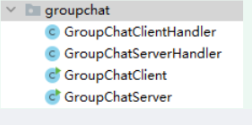

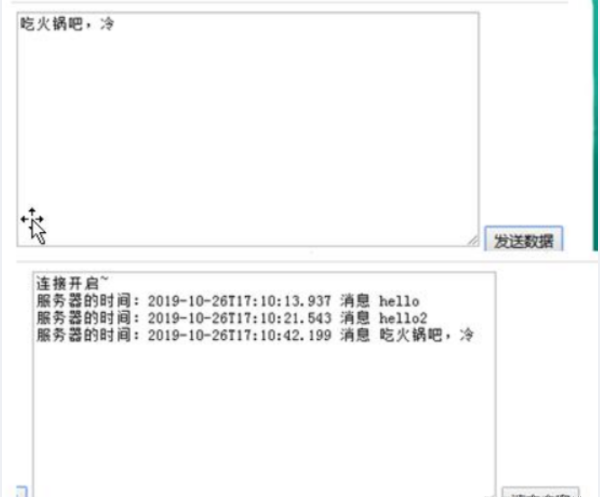
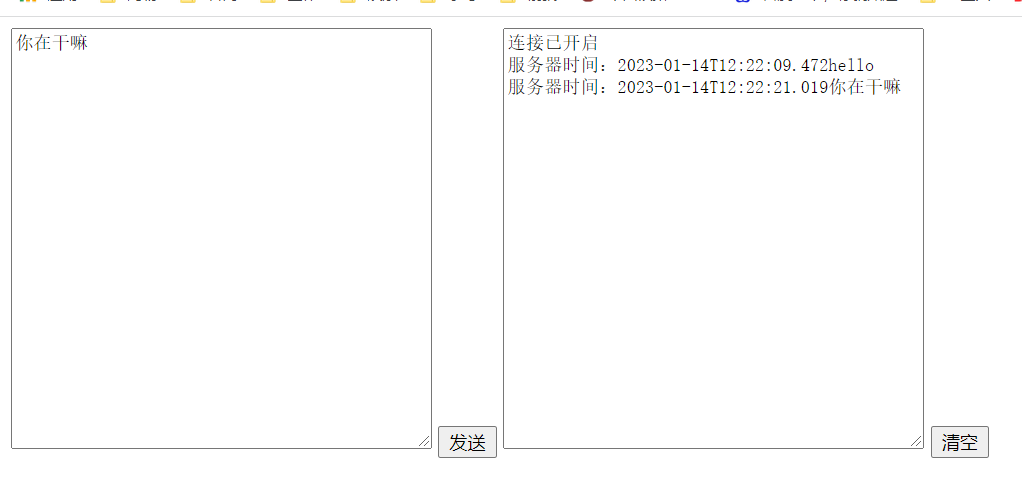


【推荐】国内首个AI IDE,深度理解中文开发场景,立即下载体验Trae
【推荐】编程新体验,更懂你的AI,立即体验豆包MarsCode编程助手
【推荐】抖音旗下AI助手豆包,你的智能百科全书,全免费不限次数
【推荐】轻量又高性能的 SSH 工具 IShell:AI 加持,快人一步
· 开源Multi-agent AI智能体框架aevatar.ai,欢迎大家贡献代码
· Manus重磅发布:全球首款通用AI代理技术深度解析与实战指南
· 被坑几百块钱后,我竟然真的恢复了删除的微信聊天记录!
· 没有Manus邀请码?试试免邀请码的MGX或者开源的OpenManus吧
· 园子的第一款AI主题卫衣上架——"HELLO! HOW CAN I ASSIST YOU TODAY
2019-01-14 Python面向对象1